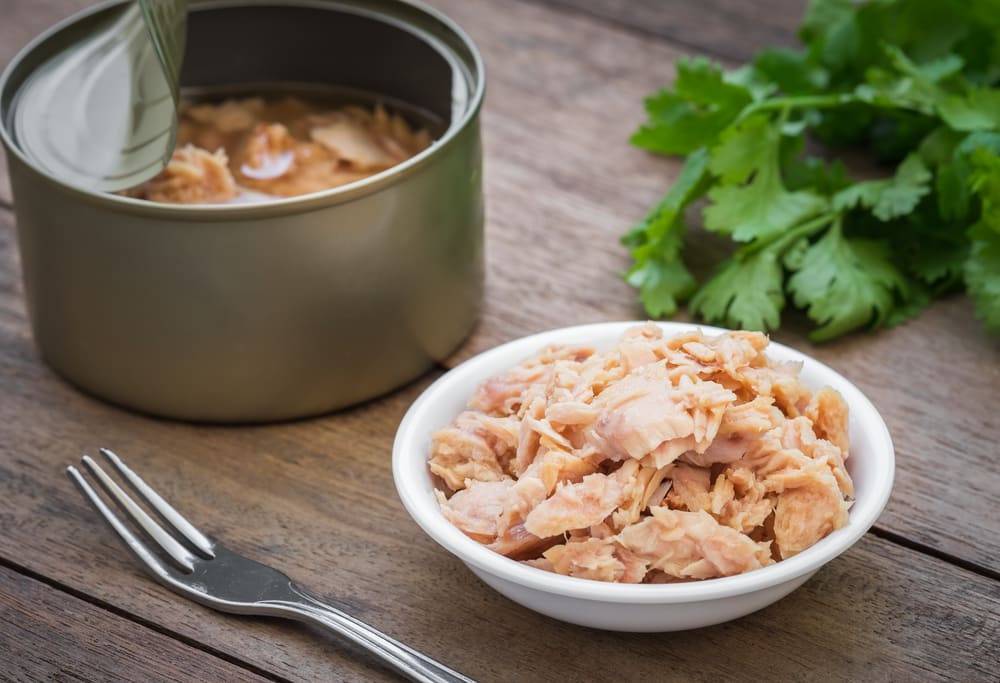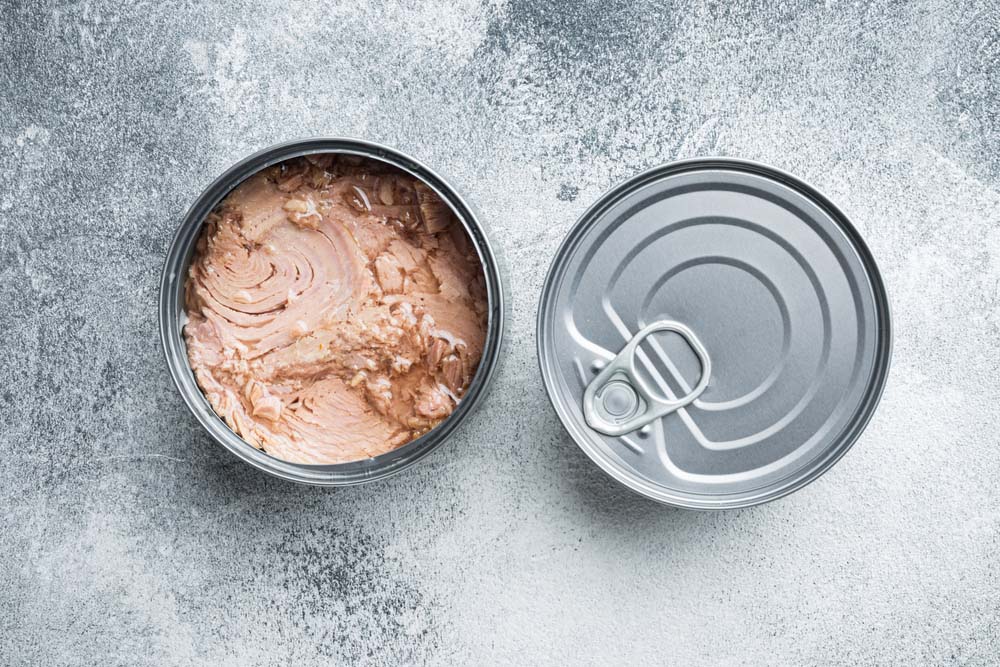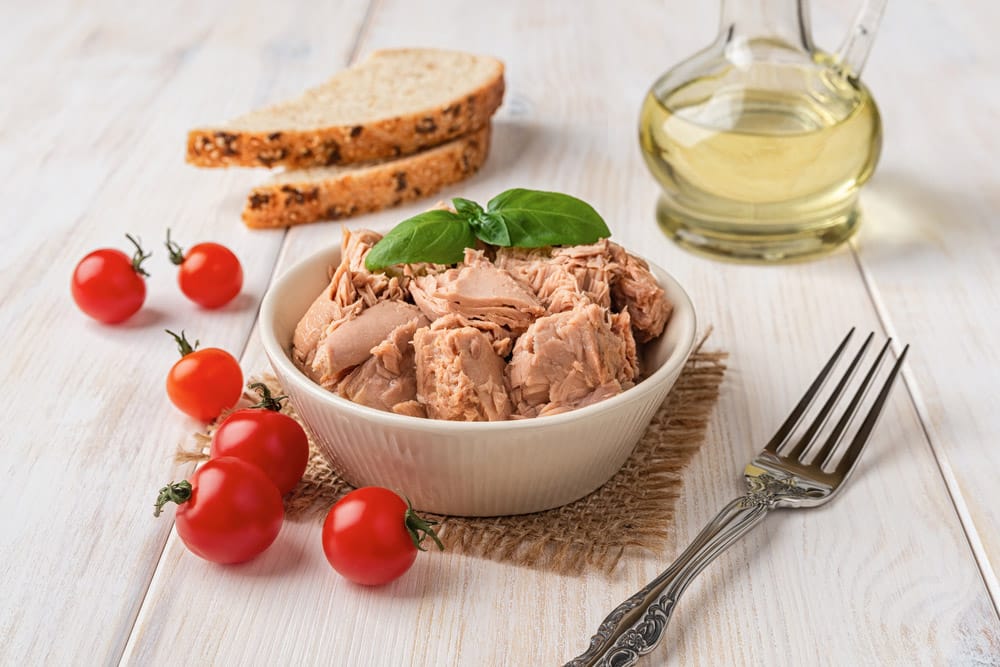
Tuna is one of the healthiest food staples out there. It’s versatile too, adding flavor to many dishes while tasting amazing in a salad. Because of its short shelf life, fresh tuna is often avoided unless it’s intended for consumption, sooner than later.
On the other hand, canned tuna is a convenient choice, given its longer shelf life. Canned tuna can last in the kitchen pantry for months and depending on the brand purchased, even up to two to five years unopened.
This is because of the canning and sterilization process which seals the tuna while preventing any new bacteria from contaminating the contents. However, many people do wonder if tuna can be eaten straight out of the can safely. Keep reading to find out more!
Can You Eat Tuna Straight Out of the Can?
During the canning process, which takes place at high temperatures to remove any bacteria, the tuna is cooked. This makes it safe to eat tuna straight from the can without any need to cook it further.
However, depending on your personal preference and the recipe you’re making, you can heat canned tuna.
White Meat Tuna vs Light Meat Tuna
When shopping for canned tuna, you’ll notice there are some differences in the varieties available. White meat tuna is 100 percent albacore while the “light” version is either yellowfin or skipjack or a combination of the two.
White meat is firmer with a lighter, milder taste compared to the light meat version which is softer with an intense flavor. Both types of tuna meat are cooked during the canning process, making them safe for consumption straight from the can.
When consuming fresh albacore tuna, less cooking is required when used in recipes due to its smaller size. If you’re concerned about food poisoning, you should cook light meat tuna for longer to ensure all bacteria have been removed for healthy consumption.
Canned white meat tuna is a great choice if you want to add a quick punch of flavor and protein to your recipe without resorting to cooking it beforehand. Alternatively, canned light meat tuna has a stronger “fishy” flavor for those who prefer a richer taste in their dish.
How To Enhance the Flavor of Canned Tuna
Canned tuna tends to have a bland or less savory flavor compared to the fresh version favored by gourmets! However, if you need to eat tuna straight out of the can but want to enhance the bland flavor, here are some of our useful tips for adding richness and taste to the dish:
- Add chopped onion to the can before eating the tuna.
- Place a whole, unpeeled lemon into the can for a few minutes before eating for extra flavor.
- Sauté canned tuna in olive oil for a few seconds (while this method takes away the idea of eating straight out of the can, the scrumptious flavor makes it worthwhile!)
- Adding some salt or minced garlic to the can gives more punch to the flavor when eaten together with chips or crackers!
- Sauté sweet onions in olive oil until soft before mixing into the canned tuna for delicious flavors.
- Using tomato sauce instead of water during the canning process at home makes the tuna more appetizing.
- Drain out the canning liquid before adding some olives, cucumber, and sweet peppers for delectable and versatile flavors.
- Adding chopped salad vegetables to the canned tuna gives you an instantly fresh, healthy, and tasty lunch.
- Mixing salt, pepper, and olive oil with canned tuna turns it into a mouth-watering spread on bread, toast, or crackers.
By using a combination of ingredients and seasonings, you can enhance the bland flavors of canned tuna while eating it straight out of the can.
The Downsides of Consuming Canned Tuna
Canned tuna is a wonderful source of protein while rich in Vitamin D and omega fatty acids. It’s cheaper than fresh tuna and more convenient with longer shelf stability.
While it’s evident that you can eat canned tuna straight out of the can, is it something you should do often if at all? What health concerns should you be aware of, especially if you have a history of illnesses?
- Mercury Contamination
Due to water contamination, high levels of mercury are often present in fish. A heavy metal, mercury can cause serious health problems such as an impaired central nervous system if you consume too much of it.
Being carnivorous, tuna feed on other smaller fish which may already contain levels of mercury. This increases the heavy metal already existing in tuna, making the concentration of mercury higher in this type of fish.
Bigger tuna such as albacore contain higher concentrations of mercury compared to skipjack or yellowfin. This makes canned light meat tuna a safer option.
- Sodium Content
Canned tuna is higher in sodium content than the fresh version. This can cause increased blood pressure, resulting in cardiovascular issues.
If you battle high blood pressure and your medical practitioner has advised you to lower your salt consumption, avoid eating canned tuna. Alternatively, look for brands that use water as the canning liquid or use less salt during the process.
- Bisphenol A (BPA)
Some can linings include a toxin called bisphenol A (BPA.) to prevent the metal from rusting or corroding. While more research needs to be done on this chemical, there are health concerns linked to BPA.
While not conclusive, it can potentially harm young children’s healthy development while there are links to BPA increasing the risk of type 2 diabetes and cardiovascular disease in adults.
Final Thoughts
Every kitchen pantry should contain a few cans of tuna to add to pasta dishes, salads, and as tasty fillings to sandwiches. You can eat tuna straight from the can and enjoy it even more when using our tips for enhancing its flavor.
Taking note of the downsides is important if you have health concerns especially if your children show signs of allergies, asthma, or eczema after eating canned tuna.
In these instances, opting to eat fresh tuna is advisable. But, for a convenient, cost-effective healthy protein source, canned tuna is a safe option for most people.


